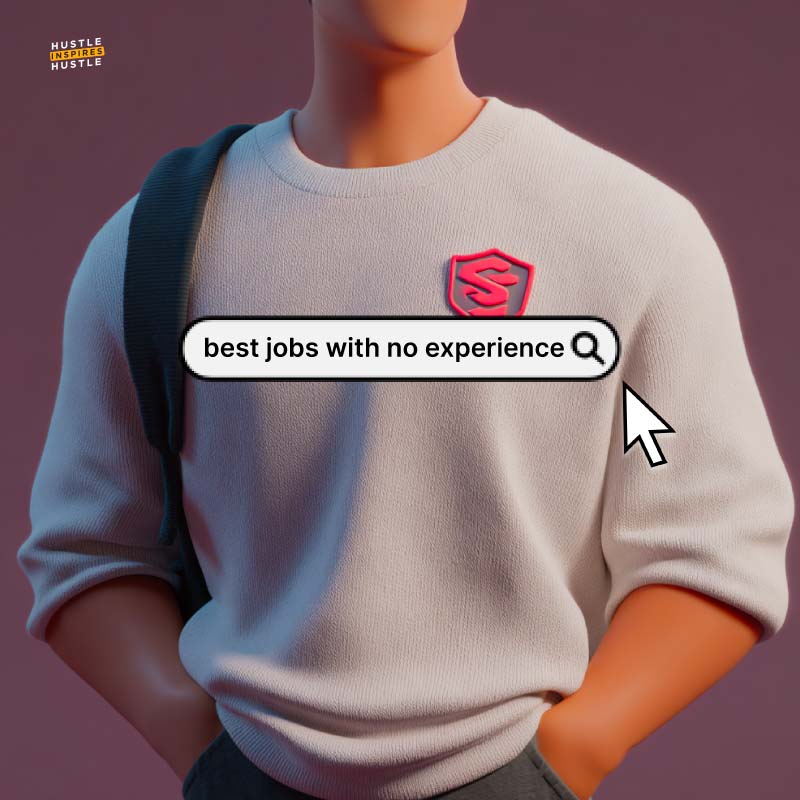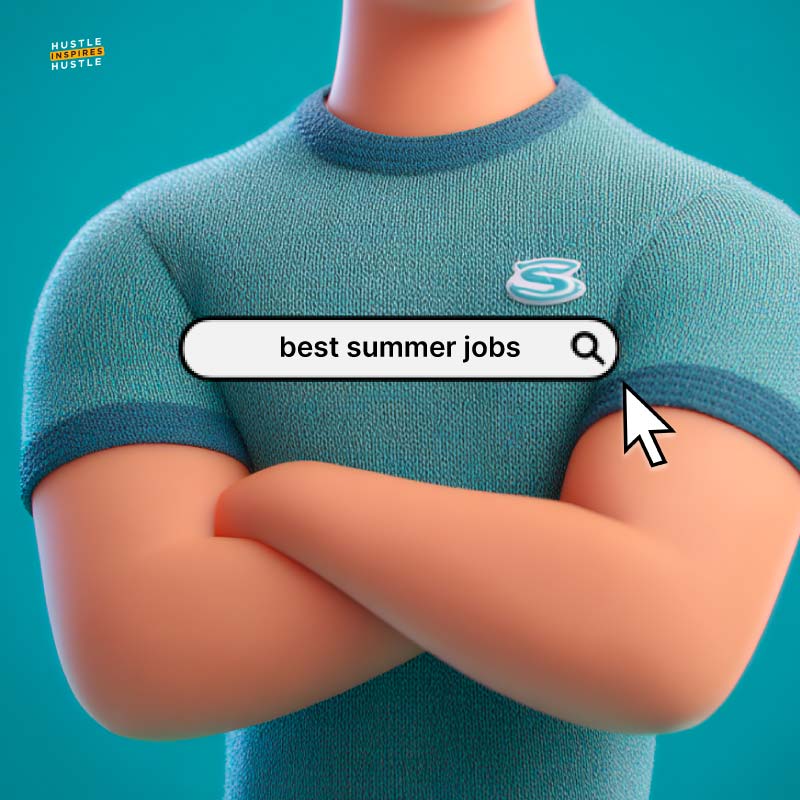Top 50 Famous Entrepreneurs in the World Who Changed Business Forever
From tech giants to cultural icons, discover 50 famous entrepreneurs and the strategies that helped them build lasting businesses.

Finding the best jobs for college students can feel like one more class on your schedule. You want work that fits around lectures, pays enough to matter, and builds skills you can use long after graduation.
This guide delivers exactly that: 29 high‑paying, flexible jobs broken down by location (on‑campus, off‑campus, remote, summer) and experience level.
Before diving into specific roles, let’s take five minutes to define what “best” means for you. The top jobs share four traits:
Rule of thumb: Combine one core job (steady hours and income) with one micro‑gig (flexible, skills‑focused) for 90 days. Audit your time, earnings, and GPA at the end of each month, then iterate. If unpredictable schedules dominate your calendar, consider remote chat support or virtual assistant work.
If you thrive on campus community, look for library, rec center, or resident assistant roles. Want the highest hourly upside? Choose skill‑based gigs like tutoring, design, or coding. Need summer income bursts? Camps, lifeguarding, or national parks provide concentrated cash and great stories.

On‑campus roles eliminate commute time, fit around classes, and often allow downtime to study. A campus job can provide income, practical work experience, and network connections. Supervisors and co‑workers understand exam priorities and class schedules, and you’ll meet other motivated students.
Many positions qualify for Federal Work‑Study, which pays you via a regular paycheck and doesn’t reduce future student aid.
Quiet environment, predictable shifts and, depending on policy, homework‑friendly downtime. You’ll help librarians catalog books and research materials and operate the circulation desk. The national average salary is about $36,614 per year (roughly $18 per hour), but pay varies by school.
Skills required: Customer service, organization, and time management. It suits both introverts and extroverts.
Tip: Grab morning or late‑night slots for quieter shifts and ask about exam‑week coverage policies.
These high‑signal roles signal subject mastery and look impressive on grad‑school or job applications. Teaching assistants help professors set up lessons, monitor attendance, and guide students.
Tutors work one‑on‑one or with small groups, often in the writing center or math lab. Pay is often above average; tutors earn a median $20.26 per hour, with top earners approaching $41 per hour.
Skills required: Communication, leadership, and curriculum design. Build an “impact portfolio” documenting student outcomes or tools you created.
For tech‑curious students (even those with no experience), campus IT roles provide training. You’ll troubleshoot networks and classroom technology. The national average salary for IT assistants is around $52,746 per year.
Skills required: Troubleshooting, ticketing software, calm communication. Capture metrics like tickets closed and satisfaction scores for your résumé.
Flexible nights and weekends with built‑in teamwork. Perfect for social students. Rec center roles include front desk, equipment checkout, or class instructor; events crews handle setup and breakdown for concerts and conferences.
Skills required: Teamwork, operations, and first‑aid/CPR (which may increase shifts). Sign up early for major event weeks.
High responsibility paired with free or discounted housing. Resident assistants live in dorms, enforce rules, plan events, and support students. The national average salary is about $36,023 per year, but compensation often includes room and board.
Skills required: Leadership, crisis management, and documentation. Prepare stories about mediation, crisis response, and program design for future interviews.

Off‑campus roles provide quick hiring and tip potential. Here are some positions near campus or with short shifts.
Coffee shops and restaurants are great starting points for students because they hire quickly, offer steady hours, and include tip income. The average barista in the U.S. earns around $13 per hour, with top earners making closer to $15 per hour. Morning and evening shifts fit easily around class schedules.
Many students also find solid part-time roles at fast-casual restaurants like Chipotle, where you can gain customer service experience, learn teamwork under pressure, and earn predictable pay with opportunities for advancement.
Strong customer service, cash handling, and upselling skills make you stand out. For safety, plan reliable transportation home after late shifts, using rideshare or bike-sharing options if available.
These high-trust roles often pay above average because reliability and care are essential. Babysitters in the U.S. earn about $17.62 per hour, with most earning between $15.14 and $19.71. Pet sitting and dog walking offer similar flexibility and independence.
Focus on building recurring clients and positive testimonials. Create simple routes for dog walks or combine pet sitting and walking to increase your effective hourly rate. Dependability and communication are key to long-term success.
Retail roles help you develop real-world experience in sales, inventory management, and store operations while often providing employee discounts. These positions build confidence and communication skills useful in any career.
Request exam-week flexibility early and work with your manager to secure a consistent schedule. Track your sales performance and include measurable results in your résumé, such as “Increased seasonal sales by 10% through improved product placement.”
With this, you get night and weekend flex plus potential to combine with audio‑learning (podcasts, recorded lectures). Pay depends on tips and mileage.
Tips: Budget for gas and maintenance. Optimize route density and avoid risky zones; choose day routes if you’re new to driving.

Remote work lets you control your schedule and often pays better than campus gigs.
You should focus on jobs that build a portfolio or deliver real business outcomes rather than one‑off surveys. Be sure to vet companies and ask for written scopes.
Virtual assistants help entrepreneurs and small teams by managing email, scheduling, research, and basic document creation. The average VA earns about $19.43 per hour, with rates ranging from $12 to $30 per hour. Success in this role comes from being organized, communicative, and proactive in solving problems.
Tools like Google Workspace, Notion, and Slack make coordination easier. Start with 5 to 10 hours a week and reach out to founders or niche creators who are often quick to hire reliable help.
This role is ideal for creative multitaskers who enjoy managing online communities. You can package services such as clip editing, captioning, scheduling, and community engagement, while using analytics to measure growth.
Offering weekly dashboards that show performance trends like saves, shares, and follower growth adds real value. Strong skills in content strategy, analytics, and customer engagement will set you apart.
Develop theme-based systems tailored to your niche, and see our guides on the best laptops to work from home and virtual assistant basics for more tips.
Content writers and copywriters craft persuasive, search-friendly material that drives results. Start with short briefs or outlines and deliver SEO-ready drafts that show a clear understanding of audience needs.
Building a small portfolio with three samples (a blog post, an email, and a landing page) helps potential clients see your range. Solid writing, research, and SEO skills will help you stand out.
Track outcomes such as increased website traffic or conversions, and consider offering content refreshes or internal linking plans as add-on services. If you are new to writing, our guide to online jobs for teens has helpful practice exercises.
Online tutoring offers flexibility and strong earning potential, averaging $20.26 per hour with top earners making over $41 per hour. Effective tutors combine subject mastery, lesson planning, and empathy to create engaging, productive sessions.
Offering packages of multiple sessions, such as a five-lesson bundle, can help stabilize your income. Collecting anonymized progress data from students is also a great way to demonstrate results and build credibility with future clients.

If you are a teen or young adult looking for an online source of income, micro‑gigs let you start fast. They may not pay as much at first, but they build skills that compound over time.
User testers and QA reviewers provide feedback on websites and apps before they’re released to the public. The job involves following test scripts carefully, recording your screen or voice as you complete tasks, and noting where users might struggle.
Clear, concise communication is essential, as companies rely on your insights to improve usability.
Track your “win rate,” or the percentage of accepted test submissions, to measure performance over time. Reinvest in a quality microphone and webcam to record smoother, more professional feedback. Consistency, attention to detail, and empathy for the end user are what make top testers stand out.
Transcription work involves converting audio into accurate written text for podcasts, videos, or research projects. Quality matters more than speed, and clients value clean, well-formatted transcripts that capture tone and context.
As you gain experience, you can build templates, macros, and hotkeys to speed up your workflow without losing accuracy.
Specializing in a niche such as medical or legal transcription can command higher rates, as these fields require industry-specific terminology. Patience, focus, and strong listening skills are key to success in this role. Over time, you can expand into captioning or subtitling, where syncing text with video adds an extra layer of skill.
Freelance designers and no-code builders help businesses establish a clean and professional online presence. Using accessible tools like Canva, Figma, or Webflow, you can create logos, landing pages, or simple multi-section websites without complex coding.
Many clients appreciate ready-to-go packages such as one-page sites or brand kits that include color palettes, fonts, and social media templates.
Keeping a public portfolio with before-and-after screenshots shows your creative process and builds trust with future clients. Combining visual design skills with an understanding of branding and layout principles will help your work stand out in a crowded market.
Print-on-demand allows you to sell designs for products like T-shirts, mugs, phone cases, or stickers without managing inventory. You upload your artwork to platforms such as Redbubble, Etsy, or Printful, and the platform handles printing and shipping.
Start by testing ideas with low-cost designs to see what resonates. Optimize listings with clear titles, effective tags, and eye-catching mockups that reflect your brand’s style. Once you have consistent sales, automate fulfillment and track your conversion rates to refine what works.
Creativity, market awareness, and consistency are what turn a casual shop into a sustainable income stream.

No résumé? No problem. Focus on roles that train you on the job and value reliability and attitude over history.
Campus events staff help coordinate concerts, sports games, and orientation activities to keep everything running smoothly. Shifts are often short, energetic, and well-suited for students who enjoy fast-paced work and teamwork.
You’ll build valuable skills in logistics, customer service, and event organization while meeting new people across campus.
Arrive early, stay until the end, and look for ways to help beyond your assigned role. This reliability can earn you a spot on the preferred staff list, which often leads to more frequent and better-paying shifts.
Brand ambassadors promote new products or campus initiatives by handing out samples, engaging with students, and collecting feedback. The job combines communication, marketing, and light data tracking. Most campaigns use short scripts and focus on building awareness and participation.
Show enthusiasm, stay organized, and follow instructions carefully.
When the campaign ends, ask your supervisor for a brief confirmation letter or a note summarizing your results, such as leads captured or event engagement. This record can be a strong addition to your portfolio or résumé.
Research participants and note-takers support academic studies and student accessibility on campus. As a participant, you may take part in psychology, education, or product-related studies, often for compensation or extra credit.
Note-takers attend classes and create clear, detailed notes for students who need learning accommodations.
Both roles require punctuality, confidentiality, and strong attention to detail. Ask faculty or department coordinators about ongoing opportunities, since many research projects and note-taking programs continue throughout the semester.

Summer can be the perfect time to recharge while earning money and gaining hands-on experience. The following concentrated roles let you build your résumé, save cash, and learn practical skills that employers value.
Camp counselors guide campers through activities, build leadership skills, and create meaningful summer experiences. The role blends teamwork, communication, and adaptability as you help manage schedules, run programs, and ensure everyone stays safe and engaged.
Certifications in lifeguarding or first aid can increase pay and open the door to supervisory positions. At the end of the season, request a recommendation letter from your camp director to highlight your performance and leadership experience.
Lifeguards are responsible for maintaining pool safety, enforcing rules, and providing immediate assistance when needed.
Training usually includes CPR and rescue techniques, which are also valuable for future roles in education, recreation, or health services.
Many facilities offer overtime pay and higher rates during peak summer months. Reliability, quick decision-making, and focus are essential qualities that can lead to opportunities as a pool manager or instructor later on.
Seasonal jobs in national parks, resorts, or hospitality venues offer both income and adventure. Many of these roles provide on-site housing, helping you save money while gaining experience in customer service, logistics, and teamwork.
You’ll also have a chance to create location-based content for your portfolio, from photography to storytelling. With lower living costs and steady seasonal pay, these jobs are a great way to bank savings while exploring new environments.

If you want to earn more per hour, focus on specialization rather than volume. Build two or three strong offers that match your skills instead of taking every available gig. Expertise in one area often leads to higher rates and long-term clients.
Specialize in SAT/ACT/GRE/GMAT or advanced subjects like calculus or physics. Create your own curriculum and offer score‑based guarantees. Capture testimonials and pre-/post-results.
The average tutor rate is around $20 per hour, but test prep tutors often charge $40–$80 per hour.
Students with technical or analytical skills can earn great income by building scripts, dashboards, or automated workflows for local businesses and creators. These projects help clients save time and improve efficiency, often leading to repeat work.
Price your services by outcome rather than hourly rate to highlight the value you provide. Build a snippet or workflow library so you can reuse components and complete projects faster. For a steady income, offer monthly retainers for system maintenance or reporting updates.
Strong problem-solving and communication skills are just as important as coding ability in this field.
Photography and video work allow you to combine creativity with entrepreneurship. You can cover campus events, portraits, or social-media campaigns for student groups, small businesses, or local creators.
Sell all-inclusive packages that include shooting, editing, and final deliverables to make pricing simple and transparent.
Maintain a curated portfolio or highlight reel that shows your best work, and track performance metrics such as engagement or view-through rates to demonstrate results. Reliability, aesthetic sense, and professionalism are key to building lasting client relationships.

If your schedule is packed with labs or long classes, look for roles that allow 2–4 hour blocks or late‑night shifts.
Night desk positions in dorms or libraries offer quiet, low-stress shifts that allow time for studying while maintaining a secure environment. Responsibilities typically include greeting visitors, logging incidents, and monitoring guest access.
These roles build reliability and communication skills while teaching attention to detail and adherence to protocol. During finals or busy periods, swap shifts strategically to earn goodwill with coworkers and secure better coverage later in the semester.
Online moderation and chat support roles are ideal for those who are attentive and calm under pressure. You’ll manage community discussions, remove inappropriate content, or provide pre-written responses to customer questions.
The key skills here are tone control, timely escalation, and meeting service-level expectations. Track metrics such as threads resolved per hour to measure performance and demonstrate professionalism.
Over time, consistent results can lead to higher-level support or community management positions. These roles also pair well with a digital nomad or travel lifestyle, since they typically only require a stable internet connection and can be done from anywhere in the world; allowing you to work while exploring new destinations.
Weekend event crew work offers short, active shifts helping set up or load in for weddings, concerts, and conferences. The work is physical and fast-paced, providing a great balance for students who prefer hands-on tasks.
Always wear closed-toe shoes and gloves, listen carefully during safety briefings, and communicate clearly with supervisors. Request recurring bookings with event planners or venues to build a steady weekend income and a predictable schedule.
International students (F‑1/J‑1) have special work rules.
Reminder: Working without proper authorization is a serious violation of F‑1 status. Always check with your Designated School Official (DSO) or International Student Advisor before accepting any off‑campus job.
Finding the right job isn’t just about scrolling through listings.
It’s about knowing where opportunities live and how to approach them. Leverage campus connections, reach out to professionals and mentors online, and use the right platforms, people, and pitches to uncover real opportunities.
Landing opportunities quickly is about clarity, consistency, and confidence. You don’t need years of experience to stand out; you only need to show that you can create value.
Focus on presenting your skills in a format that makes it easy for employers to say yes.
A clear résumé, a focused portfolio, and a few well-practiced interview stories can make all the difference.
Balancing work and school is an art. Research shows that students who work more than 15 hours per week may fall behind academically and financially. Underserved students are particularly affected when working longer hours.
Aim for 10–15 hours per week during the semester and up to 25 hours during the summer.
College is about momentum. You don’t need the “perfect” job; just one solid role and one micro‑gig to start learning, earning, and building skills. Protect your GPA by limiting hours, choosing work that fits your goals, and documenting your progress.
Remember, many campus jobs are designed around your schedule, and work‑study earnings don’t reduce future aid. By stacking skills, you’ll graduate with experience and a portfolio. Choose your path today, then iterate every 30 days.
If you’ve got the entrepreneurial spark, this is also the perfect time to start your own small business or side hustle. Use campus resources, student discounts, and your network to test ideas fast and cheap. You can try freelancing, e-commerce, tutoring, or building an app. The habits you form now, shipping work, solving problems, and staying consistent, are the same ones that fuel successful founders later.
Elevate your entrepreneurial game with actionable advice and inspiring interviews from high-level entrepreneurs, business owners, and overall badasses in the game. Get more insight and inspiration on our blog posts, podcast episodes, or invite-only community.
The best jobs for college students with no experience include on-campus roles like library assistant, event crew, and IT help desk, which train you on the job. Entry-level remote positions such as virtual assistant or community moderator also fit busy schedules and help build professional skills early.
The best part time jobs for college students combine flexibility and fair pay. Campus roles, tutoring, social media management, and customer support are strong options. These best remote part time jobs for college students allow around 10–15 hours weekly, helping maintain income while keeping your GPA stable and manageable.
The best summer jobs for college students include camp counselor, lifeguard, national park staff, and festival crew positions. Paid internships also provide valuable experience. Apply before spring break, confirm housing, and request recommendation letters at season’s end to strengthen future applications and build lasting connections in your field.
Legit remote options include virtual assistant, online tutoring, content writing, and social media management. These are among the best remote jobs for college students, offering flexible hours and consistent pay. Always vet companies, request clear contracts, and track outcomes to grow your portfolio and secure repeat clients.
International students can start with on-campus employment, often the best jobs for college students new to the U.S. F-1 students may work up to 20 hours weekly during classes and full-time during breaks. For internships, secure CPT or OPT authorization and confirm eligibility with your Designated School Official.
To avoid scams when applying for the best remote part time jobs for college students, never pay to apply or accept vague offers. Verify company domains, contact details, and job descriptions. Stick to trusted campus portals, verified boards, and legitimate recruiters to ensure safe and genuine employment opportunities.



